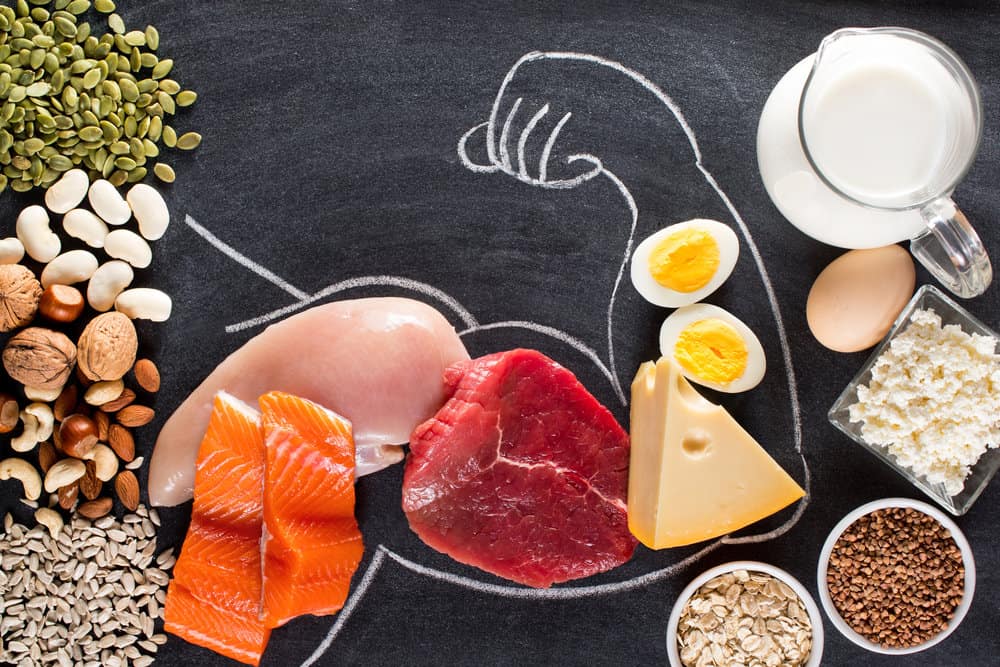
Protein is a crucial macronutrient that plays a vital role in our overall health and well-being. While protein has long been recognized as an essential component of our diet, emerging evidence suggests that the recommended protein intake may be higher than previously thought.
In this article, we will explore the importance of protein, its various functions in the body, the optimal protein intake for different age groups, and how to incorporate protein into your diet effectively.
In this article, we will explore the importance of protein, its various functions in the body, the optimal protein intake for different age groups, and how to incorporate protein into your diet effectively.
What is Protein?
Protein is one of the three main macronutrients, alongside fat and carbohydrates, and is essential for the growth and repair of our bodies. It is composed of smaller molecules called amino acids, some of which can be produced by our bodies, while others need to be obtained through the protein-rich foods we consume.
Protein can be found in a wide range of foods, and its popularity as a nutritional trend continues to grow, with many food products now boasting “high protein” claims.
The Role of Protein in the Body
Protein serves several critical functions in the body. It plays a vital role in growth and repair, contributing to the formation of muscles, hair, nails, skin, and organs. During periods of increased demand, such as athletic training, adolescence, pregnancy, breastfeeding, illness, or injury, the body requires additional protein to support optimal growth and repair.
Insufficient protein intake can lead to lower immunity, mood and concentration issues, weakness, hunger, and muscle loss, particularly as we age.
As we get older, it becomes increasingly important to maintain muscle mass, as muscle loss tends to occur naturally with aging. Preserving muscle mass has a direct impact on bone health and overall longevity. Studies have shown that lower muscle mass is associated with a higher risk of metabolic syndrome, heart disease, and increased mortality rates. By consuming adequate protein, we can support muscle maintenance, which is crucial for long-term health, independence, and vitality.
Protein can be found in a wide range of foods, and its popularity as a nutritional trend continues to grow, with many food products now boasting “high protein” claims.
The Role of Protein in the Body
Protein serves several critical functions in the body. It plays a vital role in growth and repair, contributing to the formation of muscles, hair, nails, skin, and organs. During periods of increased demand, such as athletic training, adolescence, pregnancy, breastfeeding, illness, or injury, the body requires additional protein to support optimal growth and repair.
Insufficient protein intake can lead to lower immunity, mood and concentration issues, weakness, hunger, and muscle loss, particularly as we age.
As we get older, it becomes increasingly important to maintain muscle mass, as muscle loss tends to occur naturally with aging. Preserving muscle mass has a direct impact on bone health and overall longevity. Studies have shown that lower muscle mass is associated with a higher risk of metabolic syndrome, heart disease, and increased mortality rates. By consuming adequate protein, we can support muscle maintenance, which is crucial for long-term health, independence, and vitality.
Recommended Protein Intake
The recommended protein intake varies depending on factors such as age, gender, and activity levels. Official guidelines suggest protein intakes that some nutritionists believe are set too low for optimal health.
For women, the recommended range of 0.75g to 0.94g of protein per kilogram of body weight is considered insufficient by many experts. Instead, protein levels between 1.6g and 2.2g per kilogram are recommended, increasing with age and through menopause.
For men, the official recommendations of 0.84g to 1.07g per kilogram can also be exceeded, with around 1.6g per kilogram being a beneficial target, especially for those engaged in regular exercise.
Meeting your protein needs doesn’t have to be complicated. By spreading protein intake throughout the day and incorporating protein-rich foods into each meal and snack, you can easily reach your recommended protein levels. A fist-sized portion of protein food at every meal, such as meat, eggs, dairy, nuts, or seeds, can provide around 25 to 30 grams of protein.
It’s not necessary to meticulously weigh or measure every portion, as focusing on a varied diet that includes protein-rich options can ensure sufficient protein intake. Additionally, protein powder supplements can be used on days when heavier muscle-building exercise is performed.
For women, the recommended range of 0.75g to 0.94g of protein per kilogram of body weight is considered insufficient by many experts. Instead, protein levels between 1.6g and 2.2g per kilogram are recommended, increasing with age and through menopause.
For men, the official recommendations of 0.84g to 1.07g per kilogram can also be exceeded, with around 1.6g per kilogram being a beneficial target, especially for those engaged in regular exercise.
Meeting your protein needs doesn’t have to be complicated. By spreading protein intake throughout the day and incorporating protein-rich foods into each meal and snack, you can easily reach your recommended protein levels. A fist-sized portion of protein food at every meal, such as meat, eggs, dairy, nuts, or seeds, can provide around 25 to 30 grams of protein.
It’s not necessary to meticulously weigh or measure every portion, as focusing on a varied diet that includes protein-rich options can ensure sufficient protein intake. Additionally, protein powder supplements can be used on days when heavier muscle-building exercise is performed.
The Benefits and Drawbacks of Protein Powders
Protein powder can be a valuable supplement for individuals with specific dietary needs. Vegetarians, vegans, or those with dietary restrictions may find it challenging to meet their protein requirements solely through whole foods. Protein powder provides a concentrated source of protein, aiding in muscle recovery, growth, and overall nutrition. It can be particularly beneficial for those engaged in intense workouts or seeking to build muscle mass.
When considering protein powder, it’s crucial to choose high-quality products. Look for reputable brands and read the labels carefully. Some protein powders may contain additives, artificial sweeteners, or allergens. Opt for powders with minimal ingredients and avoid those with excessive additives or fillers. Additionally, consider your specific dietary needs and preferences. There are various types of protein powders available, such as whey, casein, soy, or plant-based options like pea or hemp protein. Select the one that aligns with your dietary goals and suits your body.
While protein powder offers benefits, it’s important not to rely solely on it as a primary protein source. Whole foods provide a wide range of essential nutrients beyond protein, including vitamins, minerals, and fiber. Incorporating a variety of whole foods like lean meats, dairy products, legumes, and nuts in your diet is crucial for overall health and balanced nutrition. Protein powder should complement a well-rounded diet rather than replace whole food sources.
When considering protein powder, it’s crucial to choose high-quality products. Look for reputable brands and read the labels carefully. Some protein powders may contain additives, artificial sweeteners, or allergens. Opt for powders with minimal ingredients and avoid those with excessive additives or fillers. Additionally, consider your specific dietary needs and preferences. There are various types of protein powders available, such as whey, casein, soy, or plant-based options like pea or hemp protein. Select the one that aligns with your dietary goals and suits your body.
While protein powder offers benefits, it’s important not to rely solely on it as a primary protein source. Whole foods provide a wide range of essential nutrients beyond protein, including vitamins, minerals, and fiber. Incorporating a variety of whole foods like lean meats, dairy products, legumes, and nuts in your diet is crucial for overall health and balanced nutrition. Protein powder should complement a well-rounded diet rather than replace whole food sources.
Optimizing Protein Intake for Metabolic Health
A recent study led by Assistant Professor Yoshitaka Kondo and his team from Waseda University in Japan investigated the optimal amount of dietary protein needed to enhance metabolic health in aging mice. The researchers fed young and middle-aged male mice isocaloric diets with varying protein content and evaluated the effects on skeletal muscle weight, lipid profiles, and plasma amino acid profiles.
The findings indicated that a moderate-protein diet, ranging from 25% to 35% protein, contributed to better metabolic health in both young and middle-aged mice. The study also revealed fluctuations in plasma amino acid concentrations with age and protein intake levels, highlighting the dynamic nature of protein requirements throughout life.
Based on these findings, Kondo suggests that increasing daily protein intake and achieving an ideal balance of macronutrients at each life stage may promote metabolic health and extend the period of good health without diseases, known as the health span. This study emphasizes the importance of considering age-specific protein requirements and overall macronutrient balance for enhancing overall well-being and potentially prolonging a healthy life.
Contrary to this, there has been a misconception that consuming high levels of protein can strain the kidneys and lead to health problems; however, current evidence suggests that in healthy individuals, high protein intake does not pose a risk to kidney function. It is important to note that those with existing kidney issues or kidney disease should monitor their protein intake under medical supervision.
In summary, protein plays a crucial role in our bodies and is essential for growth, repair, and overall well-being. Emerging evidence suggests that the recommended protein intake may be higher than previously believed, especially for women and as we age.
By ensuring an adequate protein intake and spreading it throughout the day, we can support muscle maintenance, bone health, and overall longevity. Incorporating diverse protein sources into our diet and considering age-specific protein requirements can help us optimize our protein intake and enhance our overall health.
The findings indicated that a moderate-protein diet, ranging from 25% to 35% protein, contributed to better metabolic health in both young and middle-aged mice. The study also revealed fluctuations in plasma amino acid concentrations with age and protein intake levels, highlighting the dynamic nature of protein requirements throughout life.
Based on these findings, Kondo suggests that increasing daily protein intake and achieving an ideal balance of macronutrients at each life stage may promote metabolic health and extend the period of good health without diseases, known as the health span. This study emphasizes the importance of considering age-specific protein requirements and overall macronutrient balance for enhancing overall well-being and potentially prolonging a healthy life.
Contrary to this, there has been a misconception that consuming high levels of protein can strain the kidneys and lead to health problems; however, current evidence suggests that in healthy individuals, high protein intake does not pose a risk to kidney function. It is important to note that those with existing kidney issues or kidney disease should monitor their protein intake under medical supervision.
In summary, protein plays a crucial role in our bodies and is essential for growth, repair, and overall well-being. Emerging evidence suggests that the recommended protein intake may be higher than previously believed, especially for women and as we age.
By ensuring an adequate protein intake and spreading it throughout the day, we can support muscle maintenance, bone health, and overall longevity. Incorporating diverse protein sources into our diet and considering age-specific protein requirements can help us optimize our protein intake and enhance our overall health.
Sources and More Information
Yoshitaka Kondo, “Moderate protein intake percentage in mice for maintaining metabolic health during approach to old age” https://link.springer.com/article/10.1007/s11357-023-00797-3
Harvard School of Public Health, “The Nutrition Source: Protein” https://www.hsph.harvard.edu/nutritionsource/what-should-you-eat/protein/#protein-package
Harvard School of Public Health, “The Nutrition Source: Workout Supplements” https://www.hsph.harvard.edu/nutritionsource/workout-supplements/
Mayo Clinic Health System, “Are you getting too much protein?” https://www.mayoclinichealthsystem.org/hometown-health/speaking-of-health/are-you-getting-too-much-proteinv
Harvard School of Public Health, “The Nutrition Source: Protein” https://www.hsph.harvard.edu/nutritionsource/what-should-you-eat/protein/#protein-package
Harvard School of Public Health, “The Nutrition Source: Workout Supplements” https://www.hsph.harvard.edu/nutritionsource/workout-supplements/
Mayo Clinic Health System, “Are you getting too much protein?” https://www.mayoclinichealthsystem.org/hometown-health/speaking-of-health/are-you-getting-too-much-proteinv


